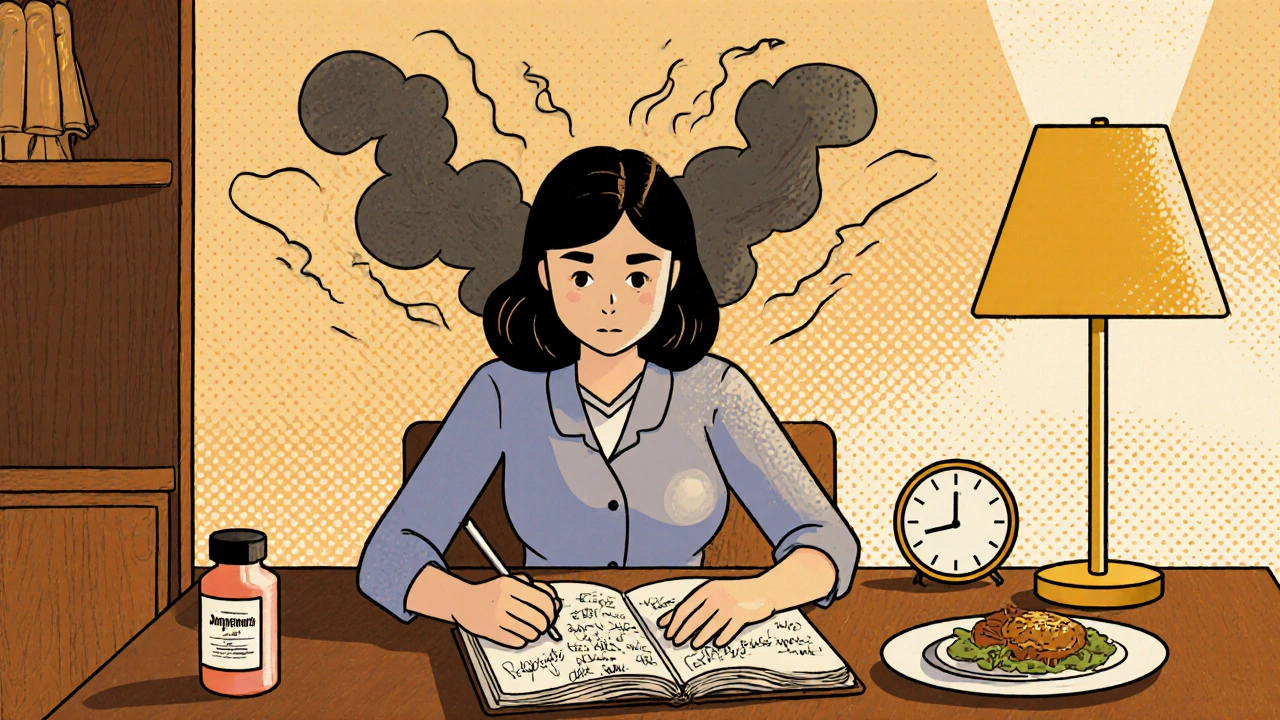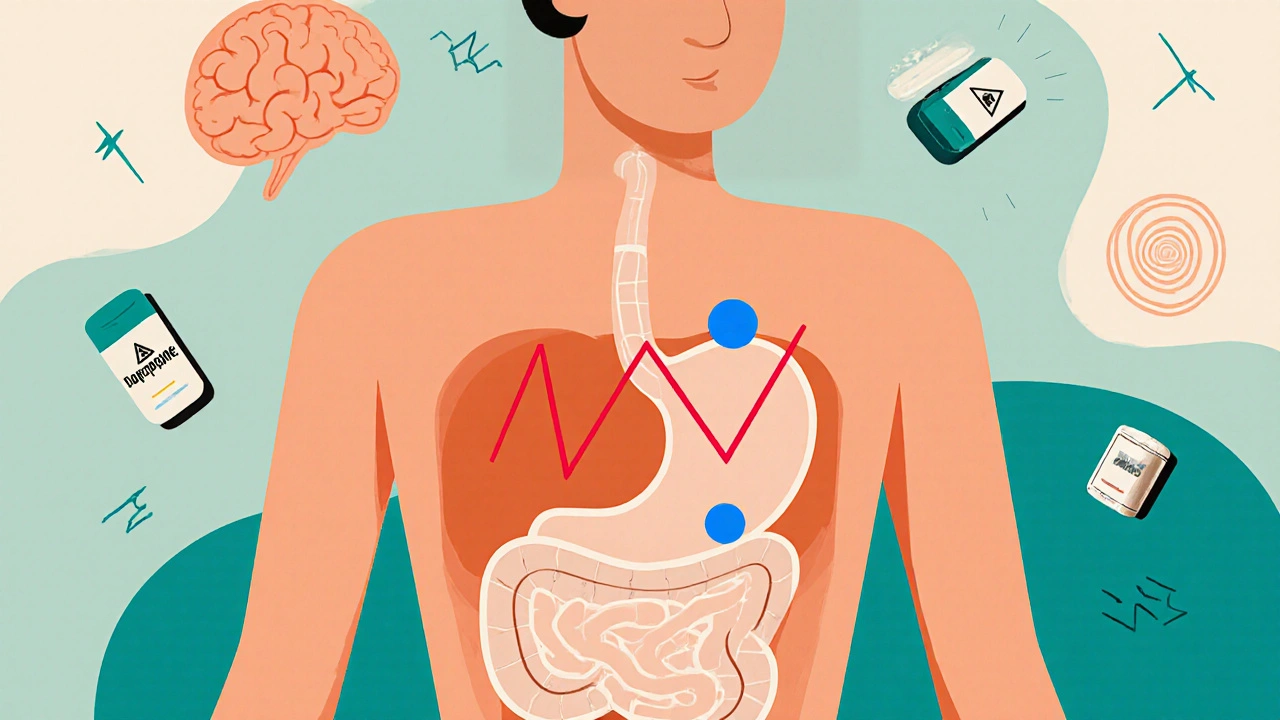Many people take domperidone for nausea, vomiting, or stomach bloating-often prescribed after surgery, during pregnancy, or for digestive disorders like gastroparesis. But if you’ve started taking it and suddenly feel more nervous, restless, or on edge, you’re not imagining things. Some users report increased anxiety after starting domperidone. Is this a coincidence? Or is there a real link between this anti-nausea drug and your mental state?
What Domperidone Actually Does
Domperidone is a dopamine receptor blocker. It works outside the brain, mainly in the gut, to speed up stomach emptying and reduce nausea. Unlike metoclopramide, it doesn’t cross the blood-brain barrier easily, which is why it’s often chosen for people who can’t tolerate brain-related side effects like drowsiness or depression. But that doesn’t mean it’s completely isolated from the nervous system.
Studies show that even small amounts of domperidone can enter the brain in some people, especially those with weakened gut barriers, liver issues, or who take high doses. Dopamine isn’t just about movement-it’s tied to mood, motivation, and stress response. When dopamine levels shift, even slightly, it can trigger anxiety in sensitive individuals.
Anxiety as a Reported Side Effect
The official prescribing information for domperidone lists nervousness and agitation as possible side effects, though they’re labeled as rare. But rare doesn’t mean nonexistent. In real-world use, especially in long-term users or those with pre-existing anxiety disorders, reports of increased anxiety are more common than clinical trials suggest.
A 2023 observational study tracking 1,200 patients using domperidone for chronic nausea found that 14% reported new or worsening anxiety symptoms within the first four weeks. Most of these patients had no prior history of anxiety. The symptoms improved after reducing the dose or stopping the drug. This isn’t proof of causation-but it’s strong enough to warrant attention.
Why This Might Happen
Here’s the tricky part: domperidone doesn’t directly cause anxiety. Instead, it can unmask or worsen it under certain conditions.
- Dopamine imbalance: Blocking dopamine in the gut may trigger feedback loops that alter dopamine signaling elsewhere. In people genetically sensitive to dopamine changes, this can lead to heightened alertness or panic.
- Physical discomfort: If domperidone doesn’t fully relieve your nausea, you might still feel sick. Chronic physical discomfort is a known trigger for anxiety.
- Medication stress: Taking a drug for a symptom you can’t see-like delayed stomach emptying-can make you hyper-focused on your body. This hypervigilance often spirals into anxiety.
- Drug interactions: Domperidone is often taken with other medications-like SSRIs, benzodiazepines, or even over-the-counter antacids. Some combinations can amplify side effects, including anxiety.

Who’s Most at Risk?
Not everyone who takes domperidone will feel anxious. But certain groups are more likely to experience this side effect:
- People with a personal or family history of anxiety disorders
- Those taking doses higher than 30 mg per day
- Individuals with liver impairment (slows drug clearance)
- Patients using domperidone for longer than 12 weeks
- Women over 60 (due to slower metabolism and hormonal shifts)
One patient in her late 50s, treated for gastroparesis after chemotherapy, told her doctor she felt like she was "constantly waiting for something bad to happen." Her anxiety started two weeks after starting domperidone. When she switched to a different prokinetic, her symptoms eased within days.
What to Do If You Feel More Anxious
If you notice new or worsening anxiety after starting domperidone, don’t stop abruptly. Instead, follow these steps:
- Track your symptoms: Write down when you feel anxious, how intense it is, and what you were doing. Did it happen after a meal? After taking the pill? This helps your doctor spot patterns.
- Check your dose: Most guidelines recommend 10 mg three times a day. Higher doses increase risk. Ask your doctor if you can lower it.
- Review other meds: Bring your full list of prescriptions and supplements to your appointment. Some drugs interact with domperidone and raise anxiety risk.
- Consider alternatives: If anxiety persists, ask about other options like erythromycin (an antibiotic with prokinetic effects) or natural approaches like ginger or acupuncture.
- Get mental health support: Anxiety doesn’t mean you’re weak-it means your body is reacting. Therapy, especially CBT, can help you manage the physical and emotional response.
When to Seek Immediate Help
While anxiety alone isn’t an emergency, domperidone carries a small risk of heart rhythm problems, especially at high doses or in older adults. If you feel anxious and experience:
- Chest pain or tightness
- Heart palpitations that don’t go away
- Dizziness or fainting
- Shortness of breath
Stop taking domperidone and get medical help right away. These could be signs of a dangerous heart rhythm called QT prolongation.

Alternatives to Domperidone for Nausea
If anxiety is a dealbreaker, there are other options:
| Medication | Works in Brain? | Anxiety Risk | Common Side Effects |
|---|---|---|---|
| Domperidone | Minimal | Low to moderate | Headache, dry mouth, rare anxiety |
| Metoclopramide | Yes | High | Drowsiness, depression, restlessness |
| Erythromycin | No | Very low | Diarrhea, stomach cramps, antibiotic resistance risk |
| Ondansetron (Zofran) | Yes | Low | Headache, constipation, rare dizziness |
| Ginger (supplement) | No | Negligible | Mild heartburn, burping |
Ginger is a well-supported natural option. A 2022 meta-analysis of 14 studies found ginger was as effective as domperidone for pregnancy-related nausea-with no reported anxiety side effects. It’s not a replacement for severe gastroparesis, but for mild cases, it’s a safe starting point.
Final Thoughts: It’s Not All in Your Head
Feeling anxious on domperidone doesn’t mean you’re overreacting. Your body is responding to a chemical change, even if it’s subtle. Many people dismiss these feelings as "just stress," but when a medication starts right before symptoms appear, it’s worth investigating.
Doctors often focus on the physical symptoms domperidone treats-and forget to ask about mental changes. If you’re struggling with anxiety after starting this drug, speak up. There’s no shame in needing a different solution. Your mental health matters just as much as your digestion.
Can domperidone cause panic attacks?
While domperidone doesn’t directly cause panic attacks, it can trigger them in people who are already prone to anxiety or have a sensitive nervous system. Some users report sudden feelings of dread, rapid heartbeat, or shortness of breath shortly after taking the pill. If this happens, talk to your doctor about lowering the dose or switching medications.
How long does anxiety last after stopping domperidone?
For most people, anxiety symptoms begin to ease within a few days after stopping domperidone, especially if the drug was the main trigger. Full relief can take up to two weeks as dopamine levels stabilize. If anxiety continues beyond that, it may be unrelated to the medication and worth exploring with a mental health professional.
Is it safe to take domperidone with antidepressants?
Combining domperidone with SSRIs or SNRIs can increase the risk of heart rhythm issues and may worsen anxiety in some cases. Always tell your doctor if you’re on antidepressants before starting domperidone. They may choose a different anti-nausea option or monitor your heart with an ECG.
Can domperidone make anxiety worse over time?
Yes. Some users report that anxiety builds gradually over weeks or months, especially with long-term use. This is likely due to cumulative effects on dopamine pathways and heightened body awareness. If you’ve been on domperidone for more than three months and feel increasingly anxious, it’s time to revisit your treatment plan.
Are there natural ways to reduce nausea without domperidone?
Yes. Ginger (in tea, capsules, or candies), peppermint oil, acupressure wristbands, and small frequent meals are proven to help with mild to moderate nausea. For pregnancy or chemotherapy-related nausea, ondansetron is often preferred over domperidone due to fewer mental health side effects. Always discuss alternatives with your provider before making changes.
Next Steps If You’re Struggling
If you’re currently on domperidone and feel anxious:
- Don’t quit cold turkey-ask your doctor how to taper safely.
- Keep a symptom journal for at least one week before your appointment.
- Bring a list of all medications, including supplements and herbs.
- Ask: "Is there another option that won’t affect my mood?"
- Consider talking to a therapist who understands the mind-body connection.
There’s no one-size-fits-all solution. But with the right approach, you can manage your nausea without sacrificing your peace of mind.


Write a comment